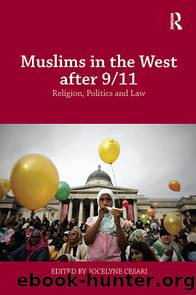Muslims in the West after 911 by Cesari Jocelyne

Author:Cesari, Jocelyne
Language: eng
Format: epub
Tags: Humanities
Publisher: Taylor & Francis
Published: 2009-11-22T16:00:00+00:00
Tolerance politics and the DIK as a “translation mechanism”
Thus far, the discussion has pointed to the constitutive distinction between legal rights and the social bearer of these rights present within the discourse of integration. It has also highlighted the equally fundamental conjoining of legal and social norms asserted within that same discourse. By simultaneously asserting the validity of the legal order and the relative unfitness of Muslims for being included in it, the policy program of the DIK can be seen as one example of a typically liberal “strategy of exclusion”: “[l]iberal exclusion works by modulating the distance between the interstices of human capacities and the conditions for their political effectivity. It is the content between these interstices that settles boundaries between who is included and who is not.”46 In the case of Germany, the threat which legal equality poses to the dominant majority is countered by making the exercise of legal rights discursively dependent on the acceptance of dominant social norms and allegiance to the social hierarchy they undergird and signify.
The preceding discussion also emphasized that this challenge is being met through a governmental policy. This statement needs to be qualified in two respects. First, and most obviously, it must be emphasized that the shift to a policy that seeks to initiate a gradual and self-directed change among Muslims does not do away with, and cannot be separated from, other policy strategies, notably coercive ones. Indeed, positive and negative technologies of power are inextricably entwined in the case of the DIK and, more generally, in German integration policies targeting Muslims. State agencies continue to conduct surveillance on organizations represented at the DIK, e.g. Milli Görüss. Further, as we saw above, one important aim of the conference is to strengthen the cooperation between security forces and Muslim groups. This cooperation has more recently grown at the level of cities and federal states47 and signals the complex conjoining of self-government with mechanisms of surveillance and discipline which target Muslims and are exercised both by state agencies and Muslims.
The position of Muslim actors inside this configuration is highly complex. Not only do some politicians expect Muslim organizations to transmit certain rules to their clientele,48 but imams and mosque associations are also asked to participate in various policing efforts. At the same time, in the context of counter-terrorism measures, imams are excluded from basic legal rights. In fact, the protection from wiretapping more generally accorded to ministers, priests and religious specialists from other recognized religious communities, is not granted to them.49
Interestingly, this “governmental” turn both results from and is rationalized by the relative lack of coercive means, whether legal or disciplinary, available to the dominant majority. The important point here is that the practitioners of this policy have as yet been unable to fully appropriate this reasoning for themselves. In other words, the initiative to convene the DIK is rationalized and has its raison d’être in the dominant majority’s ultimately unacceptable recognition that the standards of social normality have become blurred and that its hegemony has become mere dominance, so to speak.
Download
This site does not store any files on its server. We only index and link to content provided by other sites. Please contact the content providers to delete copyright contents if any and email us, we'll remove relevant links or contents immediately.
| Africa | Americas |
| Arctic & Antarctica | Asia |
| Australia & Oceania | Europe |
| Middle East | Russia |
| United States | World |
| Ancient Civilizations | Military |
| Historical Study & Educational Resources |
The Third Pole by Mark Synnott(677)
Money for Nothing by Thomas Levenson(627)
Christian Ethics by Wilkens Steve;(571)
The Economist (20210109) by calibre(566)
Made in China by Anna Qu(540)
100 Posters That Changed The World by Salter Colin T.;(498)
Reopening Muslim Minds by Mustafa Akyol(485)
Routledge Handbook of Contemporary India by Knut A. Jacobsen(477)
The Irish Buddhist by Alicia Turner(472)
Nonstate Warfare by Stephen Biddle(466)
Culture by Terry Eagleton(461)
The Great Pyramid Void Enigma by Scott Creighton(451)
The Age of Louis XIV: The Story of Civilization by Will Durant(440)
Ideology by Eagleton Terry;(436)
The Shortest History of China by Linda Jaivin(432)
Objects of Vision by Saab A. Joan;(426)
Banaras: CITY OF LIGHT by Diana L. Eck(424)
The Jews of Silence: A Personal Report on Soviet Jewry by Elie Wiesel(422)
Sybille Bedford by Selina Hastings(411)
